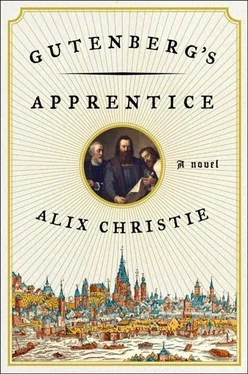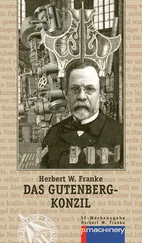“I dine with Frankfurt’s council.” Jakob made a face. “Though I’ve the clear impression I’m the meal.” He’d carried some five hundred guilders in a strongbox to fork over to the Frankfurt Elders who held Mainz’s debt. His own guild hands were just as empty as the city treasury, meanwhile, owing to a shortage of raw ores. He gave his nephew his old hawklike stare. “Go cheer Johann,” he said. “You and Gensfleisch aren’t the only ones with fortunes riding on this fair.”
Peter struck east across the square toward the house whose ground floor held the marketplace for cloth. From the Haus zum Lauberberg his father always said that he could look across to the pink gables of the Haus zum Römer and reflect that God indeed was most mysterious. If He were just, that house would still belong to Fusts, and not the Frankfurt council. He’d have been born there, if sixty years before his father’s father had not sold it and moved down to Mainz. How low we’ve sunk, he’d joke, though he was halfway serious — and never more so than this year, at this uncertain Autumn Fair.
Just past the fountain Peter spied the Kraków furrier’s back, and ran to catch him. Perhaps he’d like not just a book, he asked, but one decorated with fine painting and then bound? The trader looked him up and down. “Depends upon the price.” He’d need to speak to Johann Fust, said Peter; he was heading to the man just now. The trader’s face relaxed. “Ah, Fust,” he said. “That’s fine, I know the man.”
His father was in conversation with a merchant out of Genoa when they appeared. His face was grave, but cleared the instant that he saw them.
“Waclaw!” he exclaimed and stood and heartily embraced the Kraków trader. “I think I owe you several belts of brandy.”
The Pole grinned broadly. “Early as it is, I’ll not say no. You’re looking trim,” the trader went on as the schnapps was poured.
“The sultan’s work,” his father growled. “The thieving Turks.” They sat and drank and spoke of trade, and Peter listened. No cloth or spice or pigments had come across the Middle Sea this year for Fust to buy and trade against the cloth from England and Brabant. He had been forced to sell off inventory, meager though it was.
His bolts of cloth indeed were few, as was his offering of stones: some amber and some lapis out of Cornwall. Nor, Peter realized, had he yet smelled that choking fug of spice — the cloves and cinnamon and ginger — that had peppered his small nose long years before. Throughout the cloth hall there was, in fact, a marked lack of bustle. The streets were jammed and other stalls were overflowing. Everything seemed rich and pulsing, yet under it there was a hollowness. The traders from the north were fine, but beneath the Flemish lace, the Russian furs, the sardines and the cheeses and the hams, there was a hole where all the products from the eastern flank of Europe ought to be.
When the Pole had left, content to order an illuminated Bible, Peter pulled out all the pledges they’d received. “This ought to help,” he said. “You ought to come and see them sell.”
Fust licked a finger and riffled through the pile. Twenty, Peter said, at thirty guilders each — and even more once he had sought those buyers out and sold them the illuminations. Fust’s nostrils flared. “All paper,” he said shortly. “None of vellum.”
“He says we’ll have more luck with those among the princes.”
Fust snorted. “If any of us have the funds to stay.”
The fair was over in two weeks, and two weeks after that the princes and archbishops and the dukes from all of Christendom were slated to arrive. They even said the kaiser might appear at Frankfurt’s Reichstag, to bash those heads and get their armies pledged for the Crusade.
“It doesn’t seem as if we have much choice,” Peter replied.
Fust looked at him as if he were a stranger. “So now you’re telling me my business.”
“Follow the purses,” Peter lightly said, the buoyant feeling of the morning bursting.
“He’s followed them for sure. Collected his own payment for the letters while he’s at it, I would warrant.” Fust shook his head and reached to grab a bolt of bright green silk. “I’d be obliged if you could hold the stand while I conduct some business.”
“I only have an hour.”
“Before you spell your master, I suppose.” Fust’s eyes were flat and hard. “He has his business too, his interest to collect on all his bonds — while I go pawning to scrape up the interest on his debt.”
CHAPTER 2: SPONHEIM ABBEY
March 1486
TRITHEMIUS looks up and says, “I saw it once. Your Bible.” He stands and scans his rows of books, one hand at his tired back. “It would look well on any shelf.” A little wistfully, he smiles.
“I should have brought up mine to show you.” After the fair Peter had spent a few months rubricating his own copy, handing Anna the first page of every Bible book to embellish with her brush. It sits upon a lectern in his fine new house in Frankfurt, where he is in charge of that expanding market in new books.
“They all sold out, then?” asks the abbot. “And the kaiser — did he get a copy too?”
“They went like wildfire. Buyers came that whole first week, who then told other buyers.” Peter sees the master frozen for eternity, a statue with one arm flung out, the other cradling that monumental Bible. “It was amazing — though the Reichstag afterward was even more a triumph.” Piccolomini, the kaiser’s envoy who afterward became Pope Pius II, came down in person to inspect their stand. Miraculous , he’d marveled, holding up the pages of the Gospel according to John. “He ordered quires to send to Wiener Neustadt, for the kaiser to inspect.”
“That must have tickled Gutenberg.”
“Oh, he was like a cow in clover.” Peter cannot help himself; he smiles. It was a triumph. A memory appears as if preserved in amber: the night he and the master were asked to dine at the archbishop’s table. Gutenberg took his place among the clerks and envoys, secretaries, scribes; he was an old patrician, after all. The men bowed with great respect while he spoke knowledgeably of strategies and parleys and Crusade. Once or twice he looked intently over flaming candles at his old apprentice. See ? his bright, amused expression seemed to say. Indeed Peter had seen, a thing that he more deeply than the others could perceive: the pleasure in the master’s eyes, the acknowledgment so well deserved, so long desired.
“He was acclaimed, as you have always said,” Trithemius observes.
“They could not criticize it, not after the kaiser himself had seen the quires.” Peter never will forget the day he met the kaiser’s envoy, an Italian prince with dark and velvet eyes. “The whole first week of Autumn Fair, we rode so high.”
He sighs. Outside, the mist of early spring is sifting through the black boles of the trees.
“You made more Bibles afterward, if I am right.” The abbot returns to his seat. “Both you and he — though separately?”
The printer nods and looks up at the books that he has brought to Sponheim. No Bibles, but scholastic works, ecclesiastic law, appealing to an educated friar: Augustine, Aquinas, Clement V, and Boniface. They’re handsome in their leather rows, but nothing like those first enormous volumes they made — their Bible and their psalter. The truth of it burns him inside.
Those were the best years of his life.
That fair, those heady days — his last untrammeled joy. Where did it go, that whirling ferment when they rocked the world with their own hands? The sheer creative power that they had? He is an old man now, a businessman, a trader like the Fusts. The books he sells are mostly made by others; he packages them and sells them on. No volume he has ever printed has been as brilliant or sublime as those two books that he and Gutenberg made.
Читать дальше












